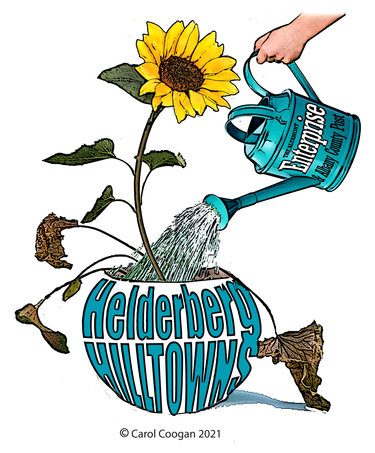In local government, democracy will flourish or fail
Ours is a government of the people, by the people, and for the people.
While much media and public attention is focused on the federal government, local government is often overlooked. And yet, local government is where citizens can most easily and directly make a difference.
The matters handled by local governments — Will a Costco be built in your neighborhood? Will your public library be open in the midst of a pandemic? Will a park in your town be preserved? — have the most impact on our everyday lives.
The Enterprise is committed to covering local government and, in the case of the Helderberg Hilltowns, is the only media organization that regularly does so.
We were gratified last week that the New York Coalition for Open Government issued a report calling on the Berne Town Board and town clerk to hear from the public and to provide more information to the public.
The president of the not-for-profit watchdog group, attorney Paul Wolf, said his organization became aware of the lack of transparency in Berne as a result of ongoing coverage by The Enterprise.
The coalition’s report said it has “never seen another local government that limits the public to being heard at every other meeting.” This is an issue The Enterprise covered since Berne’s Jan. 1 reorganizational meeting a year ago when the town board — newly dominated by Republican-backed members — implemented a number of changes.
Even this every-other-month proposal has not been adhered to. Last month, the town board defeated a motion to allow public comment at every meeting.
We agree with the coalition’s assessment: “The public should be given an opportunity to speak at every Town Board meeting.”
The state’s Open Meetings Law requires only that the public be allowed to observe board meetings, not comment at them. We commend the coalition for lobbying to change that law.
Certainly, boards can and should set parameters — such as speakers identifying themselves or requiring civil discourse — but having elected officials listen to the citizens they represent is essential to good governance.
Doing so in a public forum gives other citizens a chance to hear grievances and concerns, or praise and advice, and to weigh the merit of those comments.
Joe Golden, who formerly served on both the Berne Town Board and the Berne-Knox-Westerlo School Board, put it well in a recent letter to the Enterprise editor:
“I realize that we have a representative form of government, but to survive, that form requires input from the town residents. I can tell you from experience that sitting in a room full of upset residents and hearing them out is no party, but leadership requires it. I learned a lot from listening.
“Elected officials should not hide behind imposed silence. President Truman once said, ‘If you can’t stand the heat, get out of the kitchen.’”
Especially when there is heat, listening is important. The elected library board in Guilderland recently made the right choice — in a split vote — to hear comments from staff and residents who had legitimate concerns about safety in opening the library in the midst of both the pandemic and a construction project.
The Coalition for Open Government also reviewed the minutes on the six executive sessions held by the Berne Town Board in 2020 and, citing court decisions and opinions by the New York State Committee on Open Government, determined that motions for five of the six closed sessions were improper.
The Enterprise, too, has focused on these improprieties. Elected officials are meant to serve the citizens and should follow the letter of the law.
The coalition’s report concludes, “The residents of Berne have been subjected to a dysfunctional government, which has resulted in investigations, censures, lawsuits, audits, and improper executive sessions, all while being kept in the dark in many ways by the Town Board and Town Clerk. The town Board has additionally muted the public by not allowing the public to be heard at every Town board meeting.”
We eagerly await a response from Berne’s elected officials. None was forthcoming when our Hilltown reporter, Noah Zweifel, contacted the town’s supervisor, Sean Lyons, and the town’s attorney, Javid Afzali, to report last week on the coalition’s criticism.
We sincerely hope the town board enacts the recommended changes to better serve Berne’s citizens.
For our part, The Enterprise pledges to continue our coverage of local governments. PEN America, in a report last year on the decimation of local journalism, wrote that local news drives civic engagement.
We believe this to be true. We can see it every week in our pages and pages of letters to the editor.
With the loss of local government coverage, studies show citizens are: less likely to vote, less politically informed, and less likely to run for office.
The PEN report also cites studies demonstrating, with the decline of local news, and of watchdog journalism in particular: Government officials conduct themselves with less integrity, efficiency, and effectiveness; government corruption and costs increase: salaries, taxation, and county deficit spending go up, and federal funding goes down; and corporate malfeasance, such as environmental degradation, goes unchecked.
“These costs and benefits are not abstract — they are rooted in the very foundations of American democracy,” says the report.
We at The Enterprise are committed to robust reporting on local government and deeply appreciate the readers who support our efforts.
We opened with words spoken by Abraham Lincoln at Gettysburg in the midst of a war being fought to preserve our democracy, and our nation. It would be a shame if our democracy — our governance on a local level — were to just wither away through neglect.
We’ll close with words from T. S. Eliot’s “The Hollow Men”:
This is the way the world ends
Not with a bang but a whimper.


